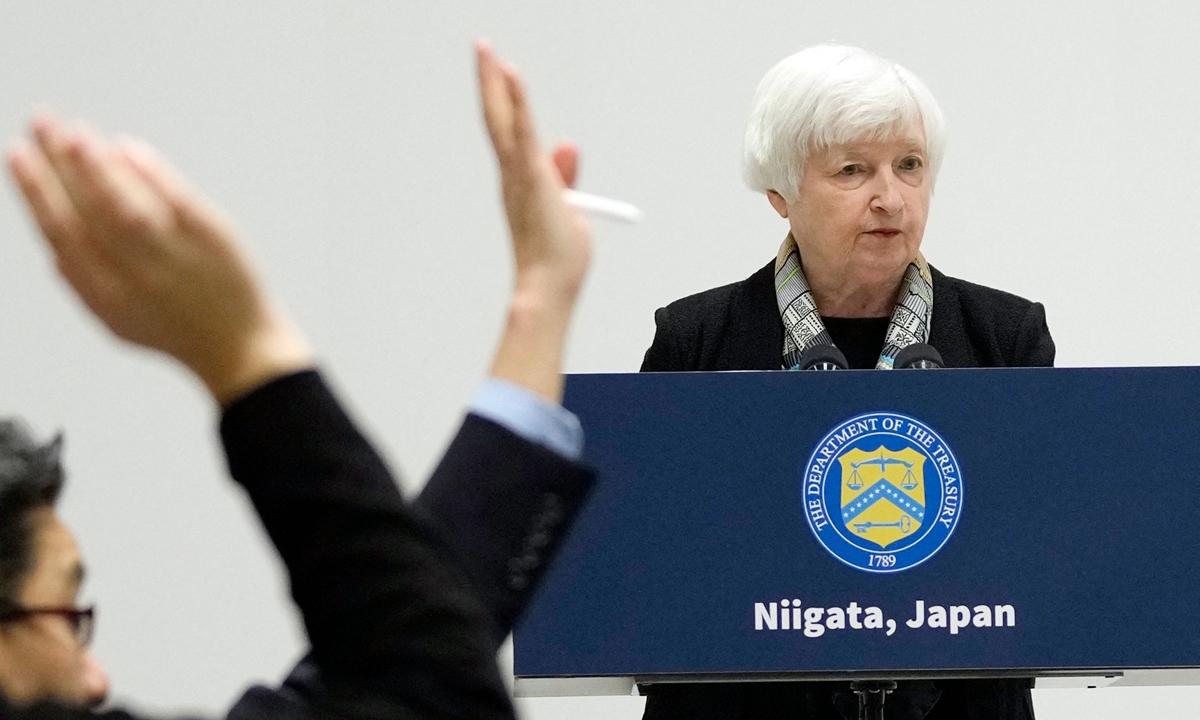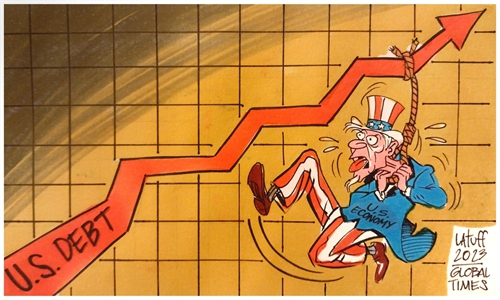US’ partisan fight on debt ceiling, attempt to shift blame to China 'irresponsible' move for global economic recovery: experts
‘Yuan to be promoted’ amid de-dollarization process as financial risks rise

US Treasury Secretary Janet Yellen takes questions from journalists during a press conference at the G7 meeting of Finance Ministers and Central Bank Governors at Toki Messe in Niigata on May 11, 2023. Photo: VCG
The US partisan fight over the debt ceiling and the attempts to shift blame to China are irresponsible moves by the world's largest economy, Chinese experts said on Sunday, and they warned that a first-ever default would disrupt global economic stability and push the de-dollarization process.
The US could default on its federal debt as early as June 1, if legislators do not raise or suspend the nation's borrowing limit and avert what could potentially become a global financial crisis, US Treasury Secretary Janet Yellen told Congress in early May.
While Democrats and Republicans are still unable to reach a consensus due to politically driven and self-centered purposes, some US politicians have attempted to connect China with the default in what experts said was another irresponsible move by the US.
On May 19, former Biden White House press secretary Jen Psaki said that China is probably "rooting for default" while talks in Washington over a debt ceiling compromise have been cut short, the Hill newspaper reported.
Similar rhetoric was used by incumbent White House Press Secretary Karine Jean-Pierre, who said that a US default would be "a gift" to adversaries, including China and Russia.
The US partisan fight and attempts to shift blame to China won't help the US' economic recovery, experts said.
A US default would not be good for China, which holds a lot of American debt, Gao Lingyun, an expert at the Chinese Academy of Social Sciences in Beijing, told the Global Times on Sunday. A default would have a very adverse impact on the valuation of the US dollar-denominated assets that China currently holds.
The US accounts for a high proportion of global expenditure, particularly in military areas where it spends several times more than any other country, and that's a major reason for its high debt, he noted.
Gao said that Democrats and Republicans want to use the debt ceiling as a game to achieve their respective political goals.
The US has changed its debt ceiling more than 100 times since World War II, and while the two US political parties often fight over the debt ceiling, they often reach a deal to avert a default.
However, as the deadline for a default approaches, it has had some impact on market confidence.
A new poll finds that about two-thirds of US adults said they are highly concerned about how the country's economy would be affected if the debt limit is not increased and the government defaults on its debts, the AP reported on Friday.
Chen Fengying, an expert at the China Institutes of Contemporary International Relations, told the Global Times on Sunday that the dispute will eventually affect the credibility of the US, its stock market and the value of the US dollar, while adding uncertainty to the global economy.
While it's anticipated that the US will raise its debt ceiling again this time, uncertainty remains for the US economy, including banks, experts said.
Hu Qimu, deputy secretary general of the digital real economies integration Forum 50, said that changes in the aftermath of the recent banking crisis remain uncertain, which is an unstable factor for the recovery of the global economy.
Raising the debt ceiling is also unsustainable, because it will dilute the value of US debt and ultimately increase the debt of the US government.
Global investors are diversifying their foreign exchange asset allocation, including by increasing yuan holdings and de-dollarization, Hu told the Global Times on Sunday.



